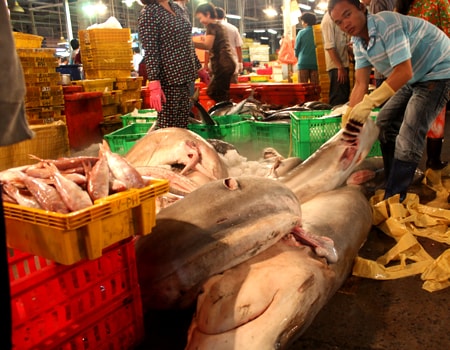After pork, it's fish's turn to be found "tainted" with banned substances
The HCM City Department of Aquatic Resources and Quality Management has just found the banned substance Trifluralin in a type of freshwater fish sold at Binh Dien wholesale market. This shows that the banned substance can still exist in seafood.
Mr. Vinh said that although the Trifluralin content detected was not high, it is a banned substance and even at low levels it is not allowed to be present in the product.
Previously, according to the 2010 circular of the Ministry of Agriculture and Rural Development, Trifluralin was included in the list of drugs, chemicals, and antibiotics banned from use in the production and trading of aquatic veterinary medicine. The reason is that this substance is harmful to health.
According to Mr. Vinh, the results of testing farmed fish samples show that fish contaminated with Trifluralin originate entirely from livestock products, because this substance is not present in natural food.
After being discovered, the incident was reported to the relevant provinces. Recently, the Department held a meeting with all provinces that import seafood to Ho Chi Minh City to tighten the management of seafood quality.
"According to initial investigation from traders, the origin of this batch of fish may come from Dong Thap and Tien Giang provinces, however, it is still very difficult to trace exactly which pond the fish are from because many traders buy and sell them before reaching the market," said Mr. Vinh.
A representative of the HCM City Department of Aquatic Resources and Quality Management said that the Department's staff is always on duty at Binh Dien wholesale market to conduct quick checks and randomly take seafood samples for testing. However, it will be very difficult if the provinces do not coordinate to do this.
According to a representative of Binh Dien wholesale market, every day, the market imports 500 to 600 tons of various types of seafood, including both caught and farmed seafood. In addition to Ho Chi Minh City, this market also receives seafood from 17 other provinces. "It is difficult for the market management board and the Ho Chi Minh City Department of Aquatic Resources and Quality Management to inspect every day and all of them," said an official of the management board.

Every day, Binh Dien wholesale market has hundreds of different types of seafood imported. All are consumed during the day, so by the time the market management board or the Department of Quality Management and Aquatic Resources of Ho Chi Minh City discovers the banned substances, it is too late. Photo:Thien Chapter
The representative of the Department of Aquatic Resources and Quality Management of Ho Chi Minh City also admitted that the inspection was only partial.The first is due to sensory suspicion that the product is not of good quality, the second is due to the department staff randomly taking samples. "Both human resources and funding to test all seafood every day is difficult. Not to mention that to bring a sample to the lab, it takes 3 to 4 days," said Mr. Vinh.
One of the major difficulties that leads to dirty seafood still being able to slip through the cracks, according to Mr. Vinh, is that current regulations on importing goods into Binh Dien wholesale market are still not strict.
"Instead of having a food safety certificate to import goods, up to now, many imported shipments are mainly self-declared by traders. Although we have implemented and provided specific instructions on the inventory book, not all traders strictly follow it. This limitation makes it difficult to trace the origin of seafood," said Mr. Vinh.
To rectify the above situation, the HCM City Department of Aquatic Resources and Quality Management requires provinces with seafood imported to HCM City to conduct inspections of aquaculture product sources, take samples for testing of farmed fish, and disseminate information to farming households. The HCM City Department of Aquatic Resources and Quality Management will continue to take samples for testing in order to promptly issue warnings to the people.
"In 2011, strict inspection of tuna at Binh Dien market helped reduce the poisoning caused by this type of fish. Therefore, we will continue to promote inspection of banned substances in fish. In addition, we have also sent a document requesting the Department of Quality Management and Aquatic Resources to soon issue regulations on importing goods to wholesale markets," said Mr. Vinh.
According to Vnexpress






